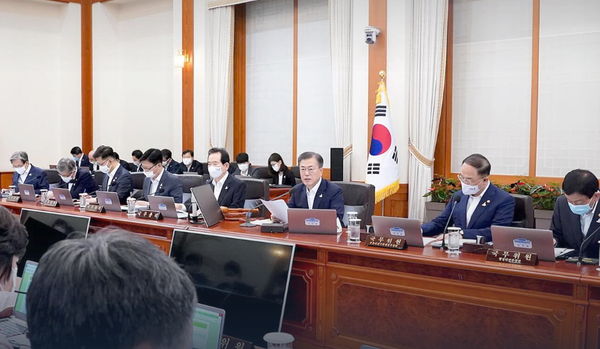Emphasizes President Moon Jae-in at Cabinet meeting on July 21
The following are excerpts from the speech of President Moon Jae-in on Korea’s New Deal proposal made at the 37th Cabinet Meeting in Seoul on July 21, 2020.—Ed.
Today’s gathering has been convened a bit early because the Cabinet members are scheduled to go to the National Assembly. The Korean New Deal initiative contains our determination to shift the metropolitan Seoul-centered axis of national development to local areas. In the short term, it will serve as a stepping stone for recovery in local economies and play a role in further promoting balanced national development in the mid to long term.

Local areas are the key investment destinations of the Korean New Deal. Most of the Government’s 114 trillion won in fiscal spending will be invested in local areas. This will significantly contribute to balanced development nationwide by creating new industries and sustainable jobs in local areas and dramatically changing local residents’ quality of life.
Many of the Korean New Deal’s signature projects are expected to symbolize change in local areas. Green Smart Schools can become hubs for local communities’ digital and green transformations, going beyond a major overhaul of schools.
Smart Green Industrial Complexes will contribute to revitalizing local economies and creating new jobs through fundamental innovations in local manufacturing. In addition, green remodeling, smart cities, smart water supply and sewerage, and the installation of underground electric wires will also reshape the foundations for residents’ living and further improve their quality of life.
In particular, green energy projects involving offshore wind energy and solar photovoltaic power will become new growth engines for local areas and create local jobs. They will also provide opportunities to guarantee residents new income through a profit-sharing scheme built upon their participation.
Closely tied to our Government’s balanced national development policy, the Korean New Deal will further accelerate regional development and make balanced development more complete. Innovation cities will be reinvigorated as hubs for a Balanced Development New Deal. Public institutions, businesses and universities must work together to cultivate talented local individuals and spearhead local innovations in order to have low-carbon and digital economies take shape in their regions. In 14 provinces and cities outside the Seoul metropolitan area, 21 special regulation-free zones have already been designated. These areas can employ forward-looking industries specifically tailored to each of them to lead the Korean New Deal. Balanced national development projects worth a total of 25 trillion won are being implemented expeditiously after being exempted from preliminary feasibility studies. Their status as infrastructure projects combined with digital and green features will be enhanced.
areas are at the center of the ever-evolving Korean New Deal. The Government intends to promote a New Deal driven by local areas. We have already witnessed various local attempts that have set examples for both epidemic prevention and responses to the economic crisis. If creative ideas tailored to local characteristics are reborn as regional New Deals, the Korean New Deal will evolve further and advance in a broad manner.
The role of local governments is very important. They are the principal agents for realizing the Korean New Deal in their areas and crafting a creative local New Deal. If local governments create successful regional New Deal cases, these can be expanded into nationwide New Deal projects.
The central government will actively support local New Deal projects that have tremendous economic viability and potential to create jobs. I hope that exemplary local cases, like the Jeonbuk-type New Deal and Gyeongnam-type New Deal, will be generated in large numbers.
he central government will strengthen communication with local governments for the Korean New Deal’s success and establish a system for robust cooperation with them. I will hold a Korean New Deal joint conference with municipal mayors and provincial governors. We will do all we can to make the Korean New Deal a novel turning point that can bring new vitality to local areas and speed up balanced national development.
At today’s Cabinet meeting, we will decide whether to designate August 17 a substitute holiday. We intend to offer a short but precious time for rest to the people, who are fatigued by the prolonged COVID-19 outbreak. We considered the fact that this year has fewer days off with Memorial Day and Liberation Day falling on weekends. I hope that this brings a little comfort to the people who have endured and quietly overcome inconveniences for the sake of everyone’s safety.
I was told some heartwarming news about local parcel delivery services designating August 14 a “delivery-free day.” Delivery service workers have become even busier with no chance to rest amid the COVID-19 crisis, and it’s fortunate that they’ll be able to enjoy the right to take time off, albeit short. I’d like to convey my special support and hope that they have a good rest.
Even if the substitute holiday is designated, many people around us will not be able to enjoy it. During the holiday, we should not forget to extend a sense of solidarity and consideration for those who have to be on duty at epidemic prevention sites, who must work without any long holidays and who have to keep factories and stores running.
I ask you all to pay close attention so that the people will not experience inconveniences in their everyday lives even if the substitute holiday is designated.

